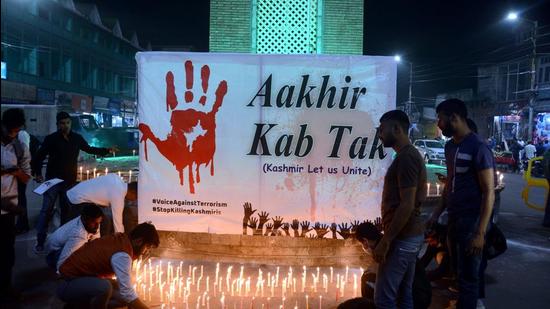In Kashmir, the selective caravans of mohabbat
Imagine a Kashmiri Pandit in the 1990s, braving all kinds of threats and hand-grenade attacks outside his shop, surviving the madness of 30 years, thinking that maybe the worst is over
We must not wait for any display of outrage over the killing of a Dalit street vendor and a Pandit chemist, both minorities in a Kashmir Valley homogenised progressively in the last three decades.

We must not wait for it because there will be none. No one will ask how a poor man from Bhagalpur, Bihar, selling golgappas on a ramshackle pushcart, became a threat to the idea of Kashmir. Or the man who opted to stay back through the 1990s, even as members of his community were being hunted down in ones and twos all over, choosing to run the most popular (and reliable) chemist shop in the heart of Srinagar.
Imagine a Kashmiri Pandit in the 1990s, braving all kinds of threats and hand-grenade attacks outside his shop, surviving the madness of 30 years, thinking that maybe the worst is over. And then, somebody whose family is most likely to have benefitted from the man’s medicines pays him a visit, shooting him dead for the sake of a black flag some young Kashmiri Muslims love to display after Friday prayers. As I write this, two more members of Kashmir’s minority, both school teachers, have been shot dead.
There will be no outrage. Remember the number of “conscientious citizens” in India who changed their Twitter display pictures to the image of the Kashmiri journalist, Aasif Sultan, arrested on terror charges, holding an Orwell book in custody. Remember the caravans of mohabbat, with their inbuilt radars for Hindutva extremism, diligently recording every aberration, but taking no note of Sultan’s Xenophobia that he clearly expressed before his arrest.
In one of his social media posts, Sultan puts up a picture of a boy, clearly a non-Kashmiri, with the hand of an invisible man grabbing him at his neck, with the message: “Remember these faces. They will come to you as bedsheet sellers, hair collectors. Kick them out.”
That non-Kashmiri boy could have easily met the fate of the poor street vendor. The dark-complexioned “Bihari,” as young Kashmiri Muslims fighting paramilitary soldiers from mainland India in the streets of downtown Srinagar do not tire to call them (in their heads it is a slur), is an outsider. He is to be kicked out, no matter if he is a soldier or a golgappawala. Or in Islamic State (IS) parlance, he is “wajib-ul-qatal” (mandated to be killed).
Imagine the horror. The poor vendor, Virender Paswan, passing a street with his cart. Thinking about his income that day or perhaps the family back home. An IS terrorist wearing a body cam right behind him in the darkness, a bullet or two in the head, and a life is gone. Imagine lining up all teachers in a school, checking their I-cards and then singling out two non-Muslims for a bullet.
On Twitter, you will find several posts about how a Hindu-Muslim angle in these killings is non sequitur. They cite the example of a Kashmiri Muslim, the third person killed on the same day as the chemist and the vendor. Even the authorities are trying to play it down by issuing statements saying only a fraction of civilians killed by terrorists this year are from minority communities. But they forget one thing. Suppose you killed a Muslim cab driver or even a street vendor on, say, charges of being a police informer. The only difference is that such killings have not and will not create a fear psychosis among Muslim drivers and vendors. They will not, like the handful of Kashmiri Pandits in the Valley, spend sleepless nights in fear, thinking twice before venturing out. They will not be killed based on the name their Aadhaar card displays. The downplaying of the fear has not worked at all. Scores of Kashmiri Pandits, most of them staying in Kashmir because of their government jobs, have left fearing a repeat of what happened to their community in 1990.
Expressing regret over the minority killings without calling out the xenophobia displayed by some among the Kashmiri Muslim society is one type of selectivism. The other is when you ask your IT cell denizens to falsely post that the Pandits celebrated Janamashatmi for the first time in the Valley since 1990. All the flags that you have put up in Kashmir have not saved the lives of people who chose to stand for them. Flags are not people. That anyone from the top BJP leadership, including Prime Minister Modi, who is extremely popular among a majority of Pandits, has failed to offer a word of assurance to the community has also been starkly noted. The Pandits also remember with dismay an insouciant comment from Union Minister Meenakshi Lekhi in August saying the exiled community was free to move wherever they wanted (suggesting the Pandits were not interested in returning to Kashmir).
At some point, beyond the rhetoric of hired dances of celebration, questions need to be asked about how the police failed to act on intelligence inputs about possible minority killings, failing to save even prominent targets such as the popular chemist. We need to ask if the government is serious about protection of the Hindu minority in Kashmir beyond its repeated usage as an instrument of electoral success in the Hindi heartland. The Kashmiri Pandits can live with caravans lying punctured outside Jawahar Tunnel. They and other citizens of this country can, but the State cannot blame these killings on the silence of activists.
Rahul Pandita is an author. His books include The Lover Boy of Bahawalpur: How the Pulwama case was
Cracked, published earlier this year, and Our Moon has Blood Clots: The Exodus of Kashmiri Pandits, published in 2013
The views expressed are personal
Continue reading with HT Premium Subscription




